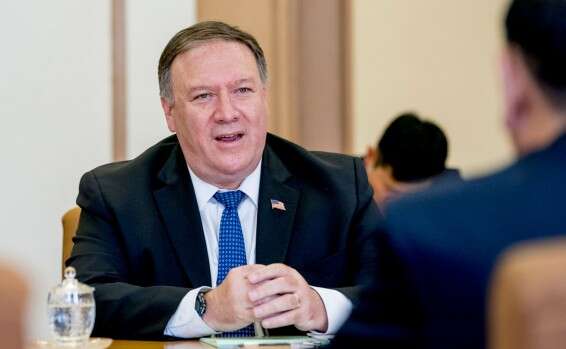U.S. Secretary of State Mike Pompeo on Tuesday said Iran will pay a price for destabilizing the region, warning it will face increased pressure if it does not become "a more normal country."
In an interview with the United Arab Emirates' paper The National, Pompeo was asked what kind of steps the U.S. would take to pressure Iran. "The tools we'll use will be varied. They'll often be diplomatic. You see the U.S.-led efforts on sanctions, so economic tools."
"We are prepared to defend the region militarily," Pompeo continued.
Amid Iranian threats to block the main shipping artery in the Strait of Hormuz, Pompeo said: "We're going to make sure that the sea lanes remain open. It's been a long-standing U.S. policy and we're prepared to make sure that that happens."
He further warned that Iran will be punished for its meddling in the Syrian civil war and in other conflicts in the region. He specifically took aim at the commander of the Iranian Revolutionary Guard Corps' elite Quds Force, Qassem Soleimani, saying he was "causing trouble throughout Iraq and Syria, and we need to raise the cost for him, for his organization and for him personally."
Pompeo's comments came during a short trip to the United Arab Emirates, a staunch U.S. ally, and as senior U.S. officials were wrapping up three days of talks in neighboring Saudi Arabia on countering threats from Iran and starving it of oil revenue.
In another interview, with Sky News Arabia, Pompeo accused Iran of using its embassies to plot terrorist attacks in Europe and warned Tehran that its actions have "a real high cost" after it threatened to disrupt Mideast oil supplies.
"Just this past week there were Iranians arrested in Europe who were preparing to conduct a terror plot in Paris, France. We have seen this malign behavior in Europe," Pompeo said in the interview.
Pompeo stressed the desire of America and its Gulf Arab allies to turn the economic screws on Iran after Trump's withdrawal from the 2015 nuclear accord that had restricted Tehran's nuclear program in exchange for sanctions relief.
Pompeo said the U.S. seeks to "deny Iran the financial capacity to continue this bad behavior" using a broad range of sanctions.
He said the sanctions were not aimed at the Iranian people, but at "convincing the Iranian regime that its malign behavior is unacceptable and has a real high cost for them."
He said the U.S. will consider requests from some countries to be exempted from sanctions it plans to impose in November to prevent Iran from exporting oil.
"There will be a handful of countries that come to the United States and ask for relief from that. We'll consider it," Pompeo said.
Iranian vice president Eshaq Jahangiri acknowledged on Tuesday that U.S. sanctions would hurt the economy, but promised to "sell as much oil as we can" and protect Iran's banking system.
Jahangiri said Washington was trying to stop Iran's petrochemical, steel and copper exports, and to disrupt its ports and shipping services.
"America seeks to reduce Iran's oil sales, our vital source of income, to zero," the Iranian Fars news agency quoted him as saying.
Jahangiri said it would be a mistake to think the U.S. "economic war" against Iran will have no impact, but added: "We will make Americans understand this year that they cannot stop Iranian oil sales."




